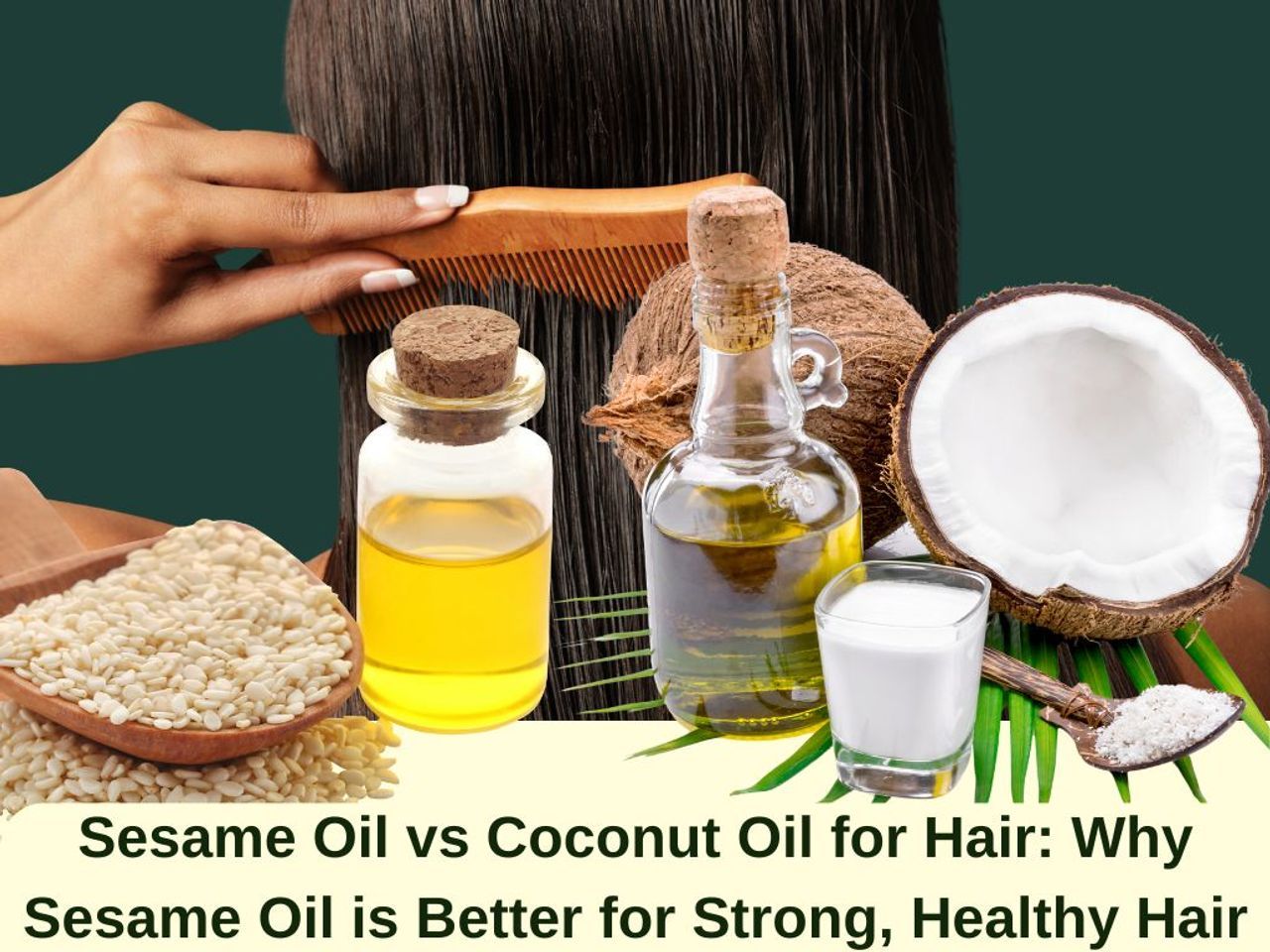Sesame Oil vs Coconut Oil: Why Sesame Oil Can Be a Superior Choice for Hair Care

For generations, hair oiling has been a deeply rooted part of Indian self-care. Among the many oils used, Coconut Oil and Sesame Oil are the most traditional and widely trusted. Both offer nourishment, moisture, and scalp conditioning. However, when we look from the lens of Ayurveda, hair science, and real-world performance—Sesame Oil (Til Tail) often emerges as the more complete and versatile oil for long-term hair health.
Let’s explore why.
Understanding Hair According to Ayurveda
Ayurveda describes hair (Keshas) as a by-product of bone tissue metabolism (Asthi-dhatu). Hair health depends on:
Proper nourishment (Ras, Rakta, Asthi dhatu)
Balanced doshas (especially Vata and Pitta)
Healthy scalp circulation
Stress management and restful sleep
Sesame oil is traditionally considered the best oil for balancing Vata, calming the nervous system, nourishing hair roots, and strengthening the scalp.
Sesame Oil: The Ayurveda-Approved Hair Oil
In Ayurveda, Sesame Oil (Til Tail) is called:
“Sneha Shresth” – among the best oils for oleation
Vata-hara – reduces dryness, roughness, and frizziness
Keshya – promotes hair nourishment
Sesame oil is extracted from Sesamum indicum seeds and is naturally rich in:
| Key Component | Role in Hair Care |
|---|---|
| Vitamin E | Scalp nourishment & antioxidant protection |
| Sesamolin & Sesamin | Protect hair from free-radical damage |
| Omega-3 & Omega-6 Fatty Acids | Strengthen hair strands & improve elasticity |
| Iron, Zinc & Calcium | Support strong hair roots and quality |
Coconut Oil: Effective but Limited
Coconut oil is widely known for:
Providing moisture
Cooling effect on the scalp
Reducing protein loss from the hair shaft
While coconut oil is soothing and helps retain hair softness, it is cooling in nature (Sheet Virya in Ayurveda). This cooling property is beneficial for certain hair and scalp types, especially in tropical climates. However, for many individuals, especially those with:
Dry scalp
Dandruff due to dryness
Frizzy or weak hair
Stress-related hair concerns
Coconut oil may not provide deep nourishment. In some cases, it may even increase dryness and roughness in the long run.
Why Sesame Oil Can Be Better for Hair Care
1. Deep Penetration Into Hair Roots
Sesame oil has a naturally low molecular structure, allowing it to penetrate deeper into scalp layers, reaching follicles more effectively than coconut oil.
This results in:
Stronger roots
Improved hair growth environment
Reduced hair fall due to weak roots
2. Better for Dry, Frizzy & Vata-Type Hair
Sesame oil’s warm, unctuous, and lubricating nature makes it ideal for:
Dry scalp and hair
Hair fall due to stress or weakness
Frizz, flyaways, and rough texture
Coconut oil, being cooling, may not reduce Vata-induced dryness effectively.
3. Supports Scalp Circulation
Warm sesame oil massage improves blood flow to hair follicles, enhancing nutrient delivery to the scalp.
This helps make the scalp environment healthier and more nourished.
4. Antioxidant Protection for Hair Aging
Sesame oil contains natural antioxidants like sesamol that protect hair from:
Pollution damage
UV exposure
Premature dullness and loss of volume
Coconut oil lacks this strong antioxidant profile.
5. Works Better With Herbs (Carrier Oil Quality)
In Ayurveda, herbal oils are prepared by infusing herbs into a base oil (Sneha Paka Vidhi).
Sesame oil is considered the best base oil because it:
Absorbs herbal actives deeply
Retains herbal potency longer
Enhances the therapeutic effect of botanicals like Brahmi, Bhringraj, Jatamansi, Amla, Kumkumadi herbs, and Neem
This is why most classical Ayurvedic hair oils are sesame-based.
Scientific Perspective: What Modern Research Says
Modern studies support sesame oil’s benefits:
Rich in antioxidants, sesame oil helps reduce oxidative stress in hair follicles.
Improves scalp microcirculation, supporting follicle nourishment.
When used with massage, it promotes relaxation and may indirectly support better hair health due to stress modulation.
Coconut oil is excellent for surface softness but has limited effects beyond moisture retention.
Which Oil Should You Use According to Hair & Scalp Type?
| Hair/Scalp Type | Best Choice | Reason |
|---|---|---|
| Dry, frizzy, rough hair | Sesame Oil | Deep nourishing & warming |
| Hair fall due to weakness or stress | Sesame Oil | Supports roots & nervous system |
| Oily scalp with heat | Coconut Oil | Cooling effect helps balance |
| Normal hair but prone to sun & pollution | Sesame Oil | High antioxidant protection |
| Sensitive scalp | Coconut or Light Sesame | Gentle and calming |
Most urban lifestyles → High stress + pollution + dryness → Sesame Oil works better.
Sesame Oil based oils for Hair Care
Hot Oil Massage Method
Warm 1–2 tbsp of sesame oil (lukewarm, not hot).
Massage roots in circular motion for 5–10 minutes.
Leave on for 30 minutes to overnight.
Wash with mild herbal shampoo.
Use 2–3 times per week for visible improvement in softness and strength.
Blending Tip (Best of Both Oils)
If you enjoy coconut oil but want Sesame’s deep nourishment, mix:
Sesame Oil 70% + Virgin Coconut Oil 30%
This gives:
Balanced texture
Nourishing + moisturizing effect
Suitable for hot climates
Conclusion
Both sesame oil and coconut oil have their place in hair care. But when we look through Ayurveda, scalp nourishment science, and deep conditioning benefits, Sesame Oil comes out superior for:
✅ Strengthening hair roots
✅ Reducing dryness and frizz
✅ Supporting scalp nourishment
✅ Offering antioxidant and protective benefits
✅ Complementing herbal actives in Ayurvedic formulations
If your goal is long-term hair resilience, strength, and thicker-looking hair, incorporating sesame oil into your routine can be a game changer.



